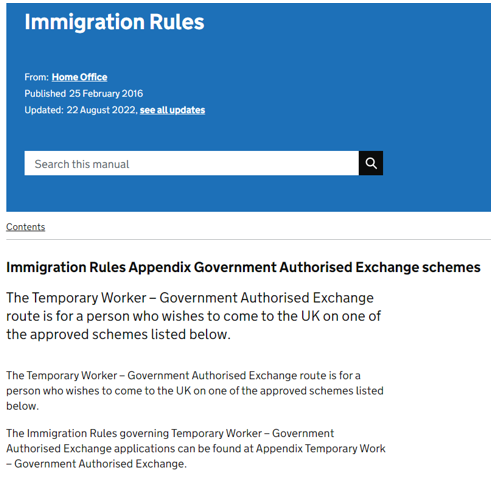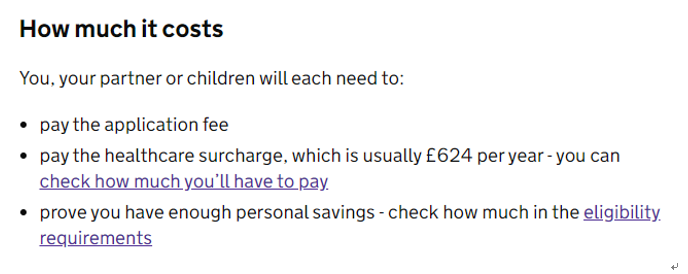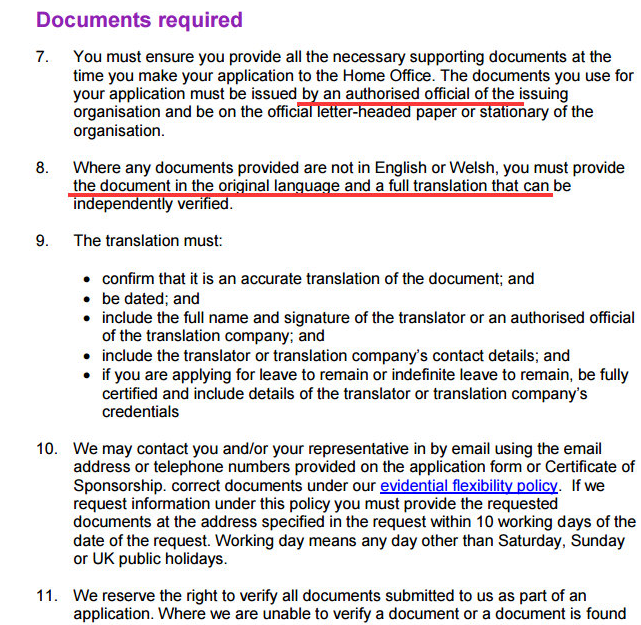临时工作签证(实习)¶
I am an advertising space: Advertising space for lease
How to Apply for a UK Internship Visa (Temporary Work Visa)? (202209QA)
Previously, the internship visa in the UK was known as Tier 5 (which has now been replaced and renamed as the Temporary Work Visa). Apart from individuals seeking short-term internships, this visa category also includes short-term volunteer visas and training visas. The Temporary Work Visa is primarily intended for those who wish to gain work experience in the UK, explore other job opportunities or avenues after completing an internship, and extend their stay in the UK. This visa can be applied for both in the UK and in China, without any restrictions on the place of application. As a result, there are many applicants for this visa, but compared to other work visas, the Temporary Work Visa has an extremely low rejection rate. In other words, as long as the eligibility criteria are met, the approval rate is close to 100%, and rejections are rare.
As shown in the image below, this is the type of Temporary Work Visa for short-term employment. It is divided into
:
Charity Worker visa (Temporary Work) 慈善工作签证(临时工作签证)
Creative Worker visa (Temporary Work) 创意工作签证(临时工作签证)
Government Authorised Exchange visa (Temporary Work) 政府认可的交流签证(临时工作签证)
International Agreement visa (Temporary Work) 国际合约签证(临时工作签证)
Religious Worker visa (Temporary Work) 宗教工作签证(临时工作签证)
Seasonal Worker visa (Temporary Work) 季节性工人签证(临时工作签证)
<img src="http://%3Ca%20href=/" https:="" www.ukstudying.com"="" style="box-sizing: inherit; border-style: none; height: auto;">ukstudying.com/static/upload/image/20220910/1662817071150459.png" title="1662817071150459.png" alt="image.png" style="color: rgb(51, 51, 51); font-family: 微软雅黑, sans-serif; font-size: 16px; white-space: normal;"/>
Generally, most people apply for the Government Authorised Exchange visa (GAE) type of visa, specifically the Creative Worker Visa (Temporary Work Visa) that we will discuss in today's guide. It mainly focuses on the GAE.
Note that the Temporary Work Visa is valid for either 12 months or 24 months and is typically not extendable. Furthermore, holding a Temporary Work Visa in the UK, regardless of the duration of stay, does not count towards the 5-year or 10-year period for applying for UK Permanent Residency (PR) visa. In other words, the entire duration of the Temporary Work Visa is not considered.
Furthermore, it is important to highlight that the Temporary Work Visa is short-term, and the duration of stay varies for each type of visa. Some visas allow staying in the UK for one year, while others permit a two-year stay. After the expiration of the one or two-year period, you cannot apply for an extension within the UK. In most cases, extensions are possible, regardless of whether they are applied for inside or outside the UK. However, this depends on specific circumstances. Even if you intend to switch to another visa category, you must apply after leaving the UK. This means that after the Temporary Work Visa expires, if you wish to switch to another visa, you must leave the UK and apply from outside. It requires applying for a new visa, and at this point, the work visa application will be subject to annual quota restrictions.
Another aspect to consider is that although the Temporary Work Visa cannot be extended within the UK once the one or two-year period expires, if you initially receive a Temporary Work Visa for only three or six months, which is less than 12 months or 24 months, you can still apply for an extension within the UK. This is because the total duration of your Temporary Work Visa does not exceed 12 months or 24 months. The actual length of your Temporary Work Visa depends on the end date specified in your sponsorship certificate.
Who is eligible to apply for the Government Authorised Exchange visa (GAE) Temporary Work Visa?
The following conditions must be met:
Individuals who wish to work or receive short-term training in the UK, participate in overseas government language courses, conduct research, or engage in government-approved exchange programs, among others. As shown in the image below, these are part of the government-authorized exchange programs that directly qualify for applying for the Temporary Work Visa. For the complete list, please refer to the link provided below.

Have a sponsoring organization that issues a Certificate of Sponsorship (COS).
Please note that the validity period of the sponsorship certificate provided by the sponsoring organization is generally only three months, and it can only be used once. The certificate itself is not a physical document but rather contains a COS number, which is used for applying for the Temporary Work Visa.
Furthermore, the sponsoring organization must be recognized by the UK government and can be a higher education institution, government department, or licensed organization.
Applicants must be from countries outside the European Economic Area (EEA) and Switzerland. The following countries are included, and as Chinese citizens, we are not within this range and need to apply.
EU countries
The EU countries are:
Austria, Belgium, Bulgaria, Croatia, Republic of Cyprus, Czech Republic, Denmark, Estonia, Finland, France, Germany, Greece, Hungary, Ireland, Italy, Latvia, Lithuania, Luxembourg, Malta, Netherlands, Poland, Portugal, Romania, Slovakia, Slovenia, Spain, Sweden and the UK.
The European Economic Area (EEA)
The EEA includes EU countries and also Iceland, Liechtenstein and Norway. It allows them to be part of the EU’s single market.
Switzerland is neither an EU nor EEA member but is part of the single market - this means Swiss nationals have the same rights to live and work in the UK as other EEA nationals.
£1,270 in savings, which can prove that you have sufficient personal funds to support yourself in the UK (prior to the application, your bank account must have a minimum balance of £1,270 for a continuous period of 90 days).
Payment of the Immigration Health Surcharge (IHS) fee.
As shown in the image below, the fees for the Temporary Work Visa vary annually, so it is important to regularly check the official website for updates.

Immigration Health Surcharge (IHS):
In addition to the visa application fee, you are required to pay an Immigration Health Surcharge (IHS). The IHS is mandatory and must be paid online before attending the visa application center for submission. Failure to do so may result in delays or rejection of your visa application. However, if your application is unfortunately rejected, the paid IHS fee will be refunded to your account.
Before applying, you can calculate the amount you need to pay for the IHS by using the official calculator provided by the UK Home Office. Here is the link:
:https://www.immigration-health-surcharge.service.gov.uk/checker/type

How long does it take to apply for a Tier 5 Internship Visa?
The earliest you can apply for the visa is three months before the start of your internship, as indicated on your Certificate of Sponsorship (CoS). The processing time for the visa application is typically around three weeks or eight weeks.
Duration of the Internship Visa:
You can stay in the UK for either 12 months or 24 months (depending on the program you are applying for) or the duration specified on your CoS plus an additional 28 days or 14 days, whichever is shorter. You can enter the UK up to 14 days before the start of your employment.
Other considerations for a successful application for a temporary work visa:
What you can do:
Study (some courses require an Academic Technology Approval Scheme certificate).
Engage in the work described in your sponsorship certificate.
Work a second job for up to 20 hours per week.
Take a job on the Shortage Occupation List for a maximum of 20 hours per week in addition to your main job. Here is the link to the Shortage Occupation List: https://www.gov.uk/guidance/immigration-rules/immigration-rules-appendix-k-shortage-occupation-list ↗
If you participate in a government-authorized exchange scheme for researchers, you can apply to switch your visa to a Tier 1 Exceptional Talent visa.
Bring your family. Your family members ("dependants") can accompany you to the UK on this visa. If your family members are from outside the European Economic Area (EEA) or Switzerland, they must hold a visa. "Dependants" refer to your spouse, partner, or children under 18 years old.
Regarding proof of funds for dependants, in addition to covering your own living expenses, you must also provide financial support for each family member. This is to demonstrate that they will have sufficient funds to support themselves during their stay in the UK. You need to prove that you have had this money in your or your dependants' bank account continuously for at least 90 days before you or they apply.
What you cannot do:
Secure a permanent job.
Access public funds. Please refer to the following note:
Note: Public funds refer to a range of benefits and housing support provided to low-income individuals. This includes the following: income-based jobseeker's allowance, income support, child tax credits, universal credit, working tax credits, social fund payments, child benefits, housing benefits, council tax reductions, council tax rebates, domestic rates relief (Northern Ireland), credit for state pension, attendance allowance, severe disablement allowance, personal independence payment, carer's allowance, disability living allowance, allocation of local authority housing, local authority assistance to homeless individuals, and other similar welfare benefits related to public resources in the UK (for specific details, please refer to the official website).
:https://www.gov.uk/government/publications/public-funds--2/public-funds)
So where do you apply?
Prepare the following documents: Certificate of Sponsorship (COS), proof of funds, valid passport, graduation certificate, academic transcript (Chinese transcripts need to be translated by a reputable translation agency recognized by the UK government), passport-sized color photographs, IELTS scores (required for applicants in China), tuberculosis test certificate (required for applicants in China), BRP (required for applicants studying in the UK), CV (resume), and others as prompted during the online application process on the official website.

First, complete the online application form and make the payment appointment. Then, visit the visa application center in person to provide your fingerprints and photographs, as it is a part of the application process to obtain the Biometric Residence Permit (BRP).
Within 10 days after your stated arrival in the UK (even if you actually arrive later), you must collect your BRP biometric residence permit card. For example, if you state your arrival as October 11th but actually arrive on October 15th, the 10-day period will still be counted from October 11th.
Official online application link: